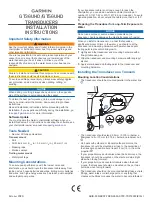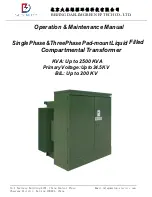
DigitalFlow™ XMT868i Programming Manual
41
Appendix C. Programming the XMT868i Using PanaView™
C.0.0a The V Averaging Option
Use this option to specify the number of readings that occur before the meter will respond to a step change in flow
rate. In general, the smaller the number of readings, the less steady the display will appear. Complete the following
steps to set the response time:
1.
From the Set Up option menu, highlight and double-click on
V Averaging
in the center pane.
2. Double-click on the desired
Response Time
(from 1 to 60 sec).
For best results, select the STATS (statistics) option, as this increases the response time under steady flow conditions
while still allowing a rapid response to changes in flow rate.
After responding to the above prompt, the meter returns to the Set Up option window.
C.5.5.2 The Default Setup Option
Use this option to initialize (reset) all of the parameters within the Set Up menu back to their default values. Complete
the following steps to reset all of the parameters:
1.
From the Set Up option menu, highlight and double-click on
Default Setup
in the center pane.
2. Double-click on
No
to keep the current values or on
Yes
to reset all values to their default settings.
After responding to the above prompt, the meter returns to the Set Up option window.
The Advanced Features Option
This option enables you to enable the more advanced features of the meter. In this option you can do the following:
•
calculate the kinematic viscosity (KV) based on signal strength (SS) or soundspeed (C3)
•
enter a table of K-factors (based on velocity or reynolds number) that compensates for non-linear flow rates
•
enable mass flow (calculated for static fluid density)
•
select the size of the transducer transmission signal.
The KV/xx Option
Note:
To choose between signal strength and soundspeed for kinematic viscosity calculations, refer to Reynolds
Correction in the
Pipe
submenu on page 37.
Use this option to calculate the kinematic viscosity (KV) based on signal strength (SS) or soundspeed (C3). To use
this option, you must enter the KV vs. SS pairs in descending order of KV and ascending order of SS (or C3). For
example, if pair 1 is KV = 10 centistrokes and SS = 62, then pair 2 must be KV
10 centistrokes and SS
62. The XMT868i
accepts 2 to 20 pairs. Complete the following steps to enter KV and SS or soundspeed values:
1.
From the Advanced Features option menu, highlight and double-click on
Enter KV/xx Values
in the center pane.
2. Click [Next Item]
to accept the current
# of KV/SS Pairs
or enter a new value (2 to 20) and click
[Next Item]
.
3. Click [Next Item]
to accept the current
Sig Strength #01
value or enter a new value (50.0 to 85.0) and click
[Next
Item]
.
Enter the signal strength values in ascending order.
4. Click [Next Item]
to accept the current
Kinematic Viscosity
value or enter a new value (0.050 to 500) and click
[Next Item]. Enter the kinematic viscosity values in descending order.
The
Sig Strength
and
Kin Viscosity
prompts repeat for each pair. After entering all the pairs, the meter returns to the
Advanced Features
option.
Summary of Contents for DigitalFlow XMT868i
Page 2: ......
Page 4: ...ii no content intended for this page...
Page 50: ...Chapter 1 Programming Site Data 42 DigitalFlow XMT868i Programming Manual...
Page 74: ...Chapter 4 Printing Data 2 DigitalFlow XMT868i Programming Manual...
Page 78: ...Chapter 5 Clearing Data 4 DigitalFlow XMT868i Programming Manual...
Page 79: ...DigitalFlow XMT868i Programming Manual 5 Appendix A Menu Maps Appendix A Menu Maps...
Page 80: ...Appendix A Menu Maps 6 DigitalFlow XMT868i Programming Manual...
Page 86: ...Appendix A Menu Maps DigitalFlow XMT868i Programming Manual...
Page 144: ...Appendix D PanaView Menu Maps for the XMT868i 70 DigitalFlow XMT868i Programming Manual...
Page 150: ...Appendix A PanaView Menu Maps DigitalFlow XMT868i Programming Manual 76...
Page 162: ...Warranty 6 AquaTrans AT868 User s Manual no content intended for this page...
Page 163: ......
















































